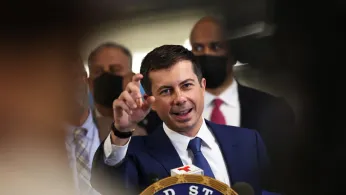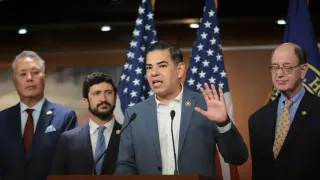
Sep 6
Pete Buttigieg Rebukes Trump Over Reversal of Airline Passenger Compensation Protections
READ TIME: 3 MIN.
Former U.S. Secretary of Transportation Pete Buttigieg issued a forceful rebuke this week following the Trump administration’s decision to withdraw a high-profile proposal that would have required airlines to provide direct financial compensation to passengers facing significant delays or cancellations attributable to the carriers themselves. The rule, first introduced during Buttigieg’s tenure under President Biden, was designed to bring the United States in line with stronger passenger protections seen in the European Union and to address longstanding consumer complaints about airline accountability .
The proposed regulation, which never went into effect, would have required airlines to pay domestic passengers up to $300 for delays of three to six hours and up to $775 for delays or cancellations lasting nine hours or more, provided the disruption was within the airline’s control . The rule was modeled after EU passenger protection laws and intended to ensure compensation for missed connections, lost time, and the extra expenses that often fall hardest on travelers with fewer resources. Advocates argued that such protections are especially critical for marginalized communities, including LGBTQ+ people, who may be more vulnerable to the economic consequences of travel disruptions.
Despite broad support from consumer advocates, the Trump administration’s Department of Transportation (DOT) announced this week that it would not move forward with the compensation rule, citing concerns about regulatory burdens on airlines and the potential for increased ticket prices. The DOT stated it would continue to enforce existing Congressional mandates on refunds for canceled flights but would not extend to the more robust compensation model proposed under Buttigieg . Major airlines welcomed the move, saying the compensation requirements would have led to higher operational costs.
In a statement to press outlets, Buttigieg condemned the reversal, describing it as “a step backwards for every American who counts on fair treatment when they travel.” He emphasized that the decision disproportionately affects travelers who lack the flexibility or resources to absorb travel interruptions, and highlighted the importance of robust consumer protections for all, regardless of identity or income . Buttigieg, who made history as the first openly gay cabinet member confirmed by the Senate, has long championed inclusive and equitable transportation policies.
Consumer rights groups and LGBTQ+ advocacy organizations echoed Buttigieg’s concerns, warning that the absence of meaningful passenger compensation rules leaves travelers vulnerable to unchecked airline practices. “This agenda makes government of, by, and for lobbyists — not the people,” said William J. McGee, Senior Fellow for Aviation & Travel at the American Economic Liberties Project, in a statement denouncing the DOT’s shift .
Organizations such as the Human Rights Campaign have previously noted that LGBTQ+ individuals—especially transgender people and those with intersecting marginalized identities—may face additional hardships during travel disruptions, including heightened risk of discrimination and financial instability. Ensuring strong passenger rights, advocates argue, is therefore a matter of both economic justice and broader equity.
The U.S. remains an outlier compared to the European Union, where airline passengers are entitled to substantial compensation for delays and cancellations caused by the airline. In the absence of federal action, U.S. travelers must often rely on the discretion of individual carriers, which critics say results in inconsistent and inadequate compensation. Buttigieg and other policy experts have pointed to the EU’s model, where clear rules and standardized compensation have led to improved transparency and accountability in the aviation sector .
The withdrawal of the proposed compensation rule has reignited debate in Washington over the appropriate balance between consumer protection and industry regulation. Supporters of deregulation argue that additional requirements could drive up costs and reduce market flexibility, while consumer advocates—and Buttigieg—maintain that basic protections should not be sacrificed for corporate convenience.
In his statement, Buttigieg reiterated his commitment to fighting for fairer and more inclusive transportation policies, both in the air and on the ground. “Travel is essential for work, family, and community,” he said. “We must stand up for the rights of every passenger, and hold those in power accountable when they fall short.”






